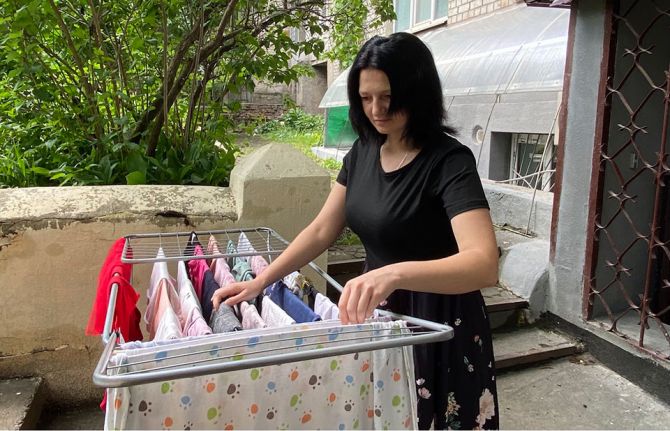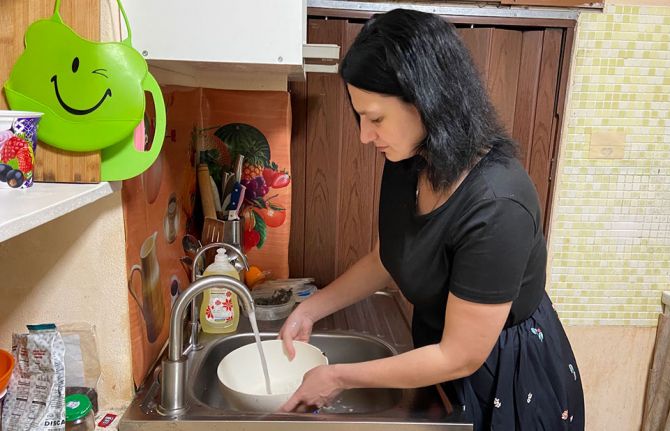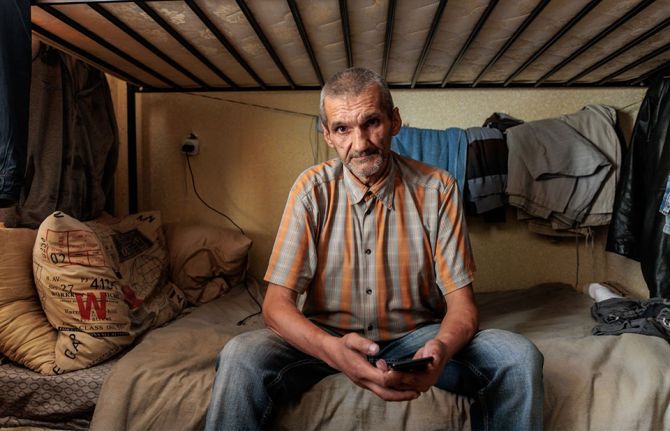



Feature Story
Women, HIV, and war: a triple burden
12 September 2025
12 September 2025 12 September 2025Lidiia comes from the Zaporizhzhia region, just steps away from Ukraine’s front line. After the full-scale invasion in 2022, her village fell under occupation. She lived in uncertainty for several long months.
“Staying there was unbearable — especially for women. It was constant fear — a nightmare,” she said. “The humanitarian situation was dire: aid vehicles couldn’t reach us, and some were simply shot at.”
Cut off from humanitarian assistance, Lidiia struggled to find basic supplies — food and hygiene products for herself and her young daughter. Most critical for her was not knowing where she could get her supply of antiretroviral therapy for HIV. People living with HIV take a daily pill to keep the virus at bay.
When medicine shortages reached a critical point, she fled her village. Before the war, the road to the eastern city of Dnipro took just three hours; this time, it took three days. Lidiia carried her baby daughter in her arms while pregnant with her son. Exhausted, she had no clear destination.
After days of uncertainty they reached Dnipro, where they found shelter run by the community-based organization “100% Life. Dnipro”. This safe haven welcomes primarily displaced people living with HIV or at high risk of infection, with a special focus on women and mothers with children. The shelters opened as part of the UNAIDS Emergency Fund 2022-2024 thanks to donor support. This shelter is among three in the Dnipropetrovsk region. They offer housing, food, hygiene products, and access to antenatal, pediatric, and HIV care. For mothers like Lidiia, it is not just shelter — it is a lifeline.
“I’m grateful we’re safe,” she said three years after arriving there. “But I still dream of going home — of walking through our front door again and knowing the war is over.”
According to UNHCR, 3.7 million people remain internally displaced within Ukraine, while another 6.9 million have sought refuge abroad. A large proportion are women and children, including many living with HIV and other vulnerable groups. Community-led research by community organisation, “Positive Women”, supported by UNAIDS and UN Women, surveyed 320 women living with HIV across Ukraine in late 2023–early 2024. It confirmed that women living with HIV are facing a triple burden: displacement, gender-based violence, and barriers in access to essential health services.
More than 70% of respondents reported worsening household economic well-being, and over a third lost property. One in six lost their jobs or businesses. Many women described being unable to meet even the most basic needs for themselves and their children. Barriers to health care have also increased as the war drags on. A third of women reported greater difficulties in reaching HIV services due to destroyed infrastructure, insecurity, or lack of resources. Women also reported high levels of anxiety, depression, and post-traumatic stress, compounded by caregiving responsibilities and separation from family.
Despite this, most managed to continue their life-saving medicine thanks to emergency distribution and community support.
For many this is a testament to the resilience of Ukraine’s health system and its civil society.
“The resilience of women like Lidiia, together with the findings of community-led research, highlight both the urgency and the possibility of action,” said Gabriela Ionascu, UNAIDS Country Director for Ukraine.“With sustained international support, community engagement, and rights-based approaches, access to vital services can be preserved—even in the most challenging of times.”



